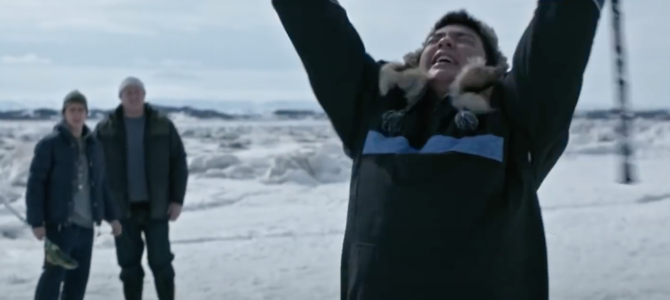
After premiering at the Toronto Film Festival in 2018, “The Grizzlies” was set for a box-office release this spring. While coronavirus had other plans, the film is almost eerily well-matched to the moment of cultural inflection brought about since its postponement. The true story of a white teacher who uses lacrosse to galvanize Inuit students in the remote Canadian village of Kugluktuk, “The Grizzlies” grapples compellingly with suicide, addiction, alienation, and race.
It’s a beautiful film, from start to finish. The opening scene is jaw-droppingly vivid and poignant, setting the tone for a movie that follows the painful arc of a struggling community that starts clawing itself out of hopelessness by rallying around a ragtag team of high school lacrosse players.
Consider the film’s description: “‘The Grizzlies’ is an inspiring true story based on a group of Inuit students in the small Arctic town of Kugluktuk. Suffering from widespread drug use, alcohol abuse, domestic violence and one of the highest teen suicide rates in the world, this northern community is periled by the legacy of colonialism.” Thematically, “The Grizzlies” tackles the same cocktail of issues consuming Western culture right now.
When Russ Sheppard arrived in Kugluktuk, the collective sense of despair was jarring. In a St. Patrick’s Day interview with The Federalist, the real-life Sheppard recalled his time in the desolate Arctic village, where even the teenagers struggled with suicide, abuse, and addiction. Now the subject of a movie, Sheppard is pleased with the final product but remains humble, just a normal guy who happened to find himself at the center of an incredible story. That’s part of what makes “The Grizzlies” special.
With spiking calls to suicide hotlines, increasing concerns about domestic abuse, sports shut down, and “relapses through the roof,” “The Grizzlies” is more relevant than it was before the pandemic rocked our world. At its heart, the film is a story about community, about how common causes can draw alienated people into supportive groups and provide purpose. With youth and professional sports struggling to restart, “The Grizzlies” also underscores the key influence athletics can have on struggling teens.
Sheppard’s outsider status initially hampered his campaign to cobble together a lacrosse team at the local high school. “Who the h-ll are you to say what we need? You’ve been here all of five minutes,” one member of the community snaps in a characteristic critique.
Filmed on location, the cast and crew were almost entirely comprised of indigenous actors, many of whom had little previous experience. The acting isn’t always Streepian but it’s not bad at all, and the film feels raw and authentic in a way it easily could not have. The cinematography is truly stunning, capturing the vast, barren landscapes in a way that emphasizes the struggles of their human inhabitants.
“The Grizzlies” has drawn expected but unwarranted complaints it relies on the “white savior” trope, which is a telling misread of the narrative. Sure, Sheppard’s heart and dedication provided the spark, but it’s clearly the people of Kugluktuk who band together and save themselves.
As the film draws to a dramatic crescendo, all the expected descriptors apply: inspiring, uplifting, heartwarming. It would have brought you to tears long before the world was thrust into a pandemic. In this fragile cultural moment, however, it offers a strikingly relevant depiction of despair, and a valuable lesson in the healing properties of a strong community. “The Grizzlies” opened in select theaters on July 31.









